Stress is called the silent killer for a reason. From panic attacks to trouble sleeping, a dose of stress can do a number of things with your health. Yet most of us are so used to keep up with the hamster wheel of chronic stress that we tend to ignore the issue until it’s too late.
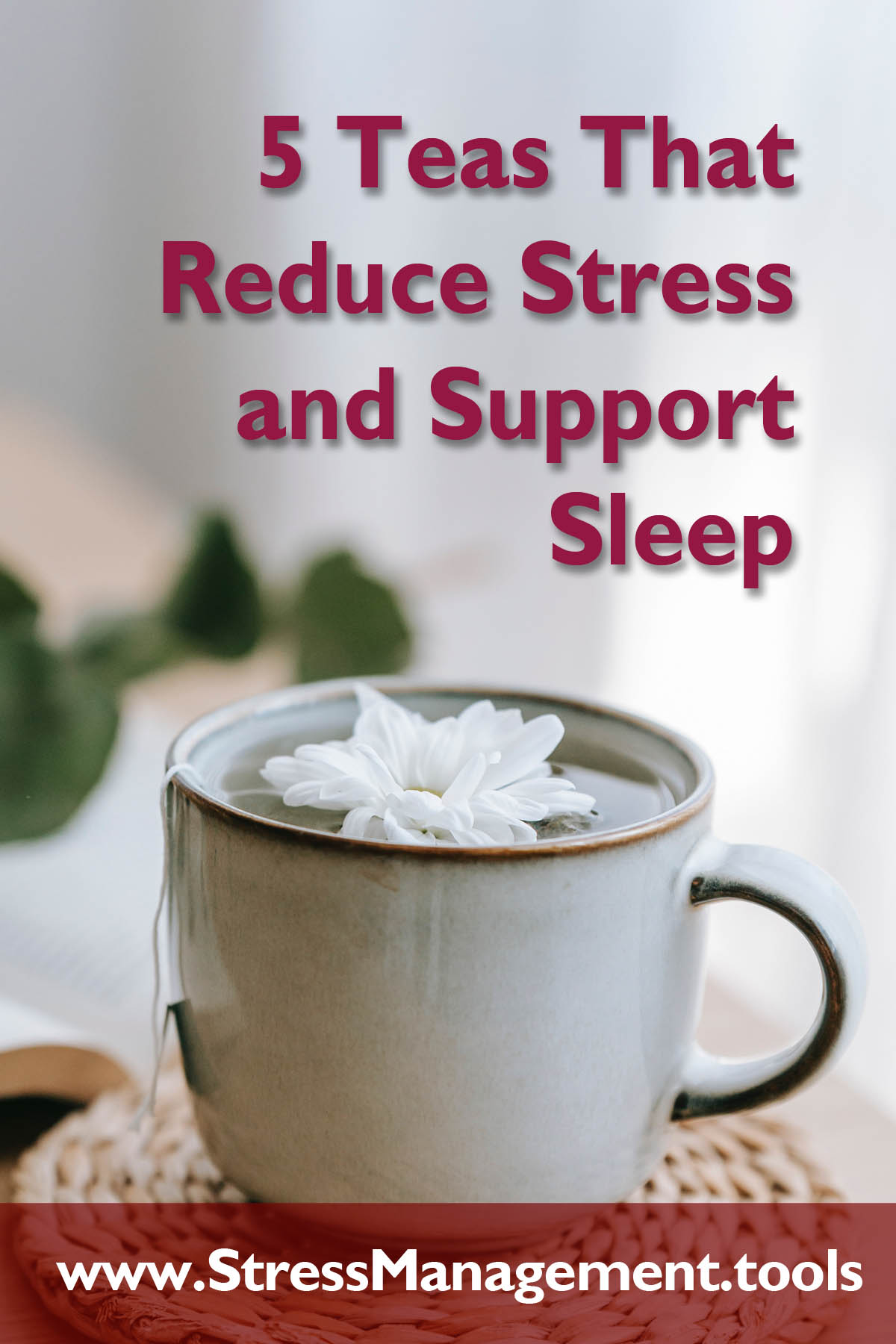
Excessive stress will quickly be felt on our quality of sleep, which in turn will increase our stress hormones. So implementing some calming teas into our night time routine can do wonders to control our stress. Not only do these teas promote relaxation, but they may help the estimated 30% of the population who suffer from chronic sleeplessness and insomnia too.1)Roth T. Insomnia: definition, prevalence, etiology, and consequences. J Clin Sleep Med. 2007 Aug 15;3(5 Suppl):S7-10. PMID: 17824495
Consider enjoying a cup of one of these teas each day:
1. Chamomile Tea. Probably the best-known choice for relaxation, chamomile tea is an ancient remedy for inflammation, anxiety, and insomnia. Some experts say that the effects of chamomile are similar to that of a mild tranquilizer.
- Chamomile is packed full of a substance called apigenin, which helps to decrease anxiety and initiate sleep. Studies have found that drinking around 400mg of chamomile extract a day can improve sleep quality.2)Adib-Hajbaghery M, Mousavi SN. The effects of chamomile extract on sleep quality among elderly people: A clinical trial. Complement Ther Med. 2017 Dec;35:109-114. doi: 10.1016/j.ctim.2017.09.010.
- Further research has also gone on to show that postpartum women suffering from poor sleep quality were soothed with chamomile tea.
- While not everyone will respond well to chamomile, the gentle taste and relaxing aroma are a great place to start if you suffer from stress.
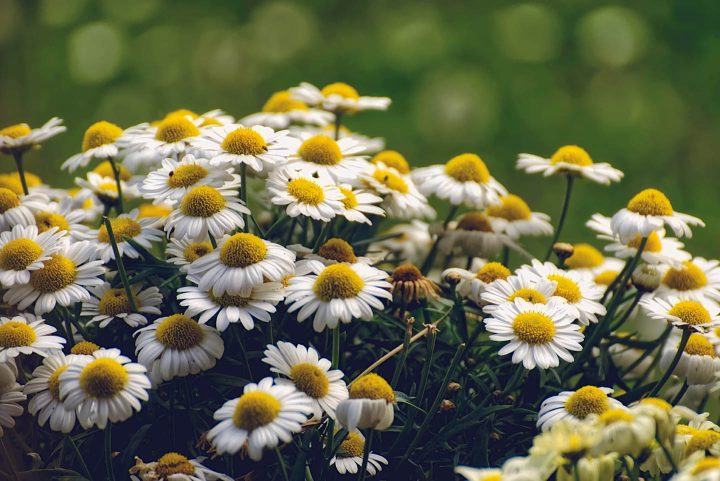
2. Valerian Tea. The valerian herb is another substance that has appeared throughout the centuries as a cure for nervousness and insomnia. The product was also used in England during World War II as a way to relieve stress caused by air raids.3)Valerian. Fact Sheet for Health Professionals. National Institutes of Health
- Valerian is one of the most popular sleep aids in the world today, and it’s available in both liquid and capsule form, as well as a tea. Researchers believe that valerian root may improve GABA levels in the body, which can improve sleepiness, and reduce anxiety.4)Dorn M. Wirksamkeit und Verträglichkeit von Baldrian versus Oxazepam bei nichtorganischen und nichtpsychiatrischen Insomnien: Eine randomisierte, doppelblinde, klinische Vergleichsstudie [Efficacy and tolerability of Baldrian versus oxazepam in non-organic and non-psychiatric insomniacs: a randomised, double-blind, clinical, comparative study]. Forsch Komplementarmed Klass Naturheilkd. 2000 Apr;7(2):79-84. German. doi: 10.1159/000021314.
- Studies into valerian root for insomnia indicate that it can reduce the amount of time it takes for a person to fall asleep at night and improve the quality of the sleep too. These studies also indicate minimal side effects after using valerian. There are no issues such as morning drowsiness to detract from the experience.5)Leathwood PD, Chauffard F, Heck E, Munoz-Box R. Aqueous extract of valerian root (Valeriana officinalis L.) improves sleep quality in man. Pharmacol Biochem Behav. 1982 Jul;17(1):65-71. doi: 10.1016/0091-3057(82)90264-7.
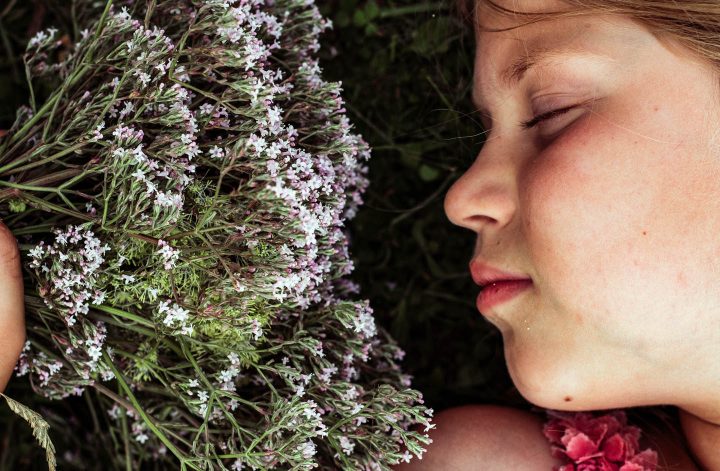
3. Lavender. There are few things more relaxing than the smell of lavender. This sweet and soothing herb is championed for its ability to reduce stress and improve sleep quality. The substance is available in tea form as a way of encouraging relaxation and stronger sleeping patterns.
- According to one study, women who drank and enjoyed the aroma of lavender tea for two weeks had less fatigue than their counterparts.6)Chen SL, Chen CH. Effects of Lavender Tea on Fatigue, Depression, and Maternal-Infant Attachment in Sleep-Disturbed Postnatal Women. Worldviews Evid Based Nurs. 2015 Dec;12(6):370-9. doi: 10.1111/wvn.12122.
- Other studies indicate that reductions in heart rate and heart rate variability were evident in women who inhaled the scent of lavender for 12 weeks, twice per week.7)Chien LW, Cheng SL, Liu CF. The effect of lavender aromatherapy on autonomic nervous system in midlife women with insomnia. Evid Based Complement Alternat Med. 2012;2012:740813. doi: 10.1155/2012/740813.
- Try sweetening this tea with honey for a unique sleeping experience.
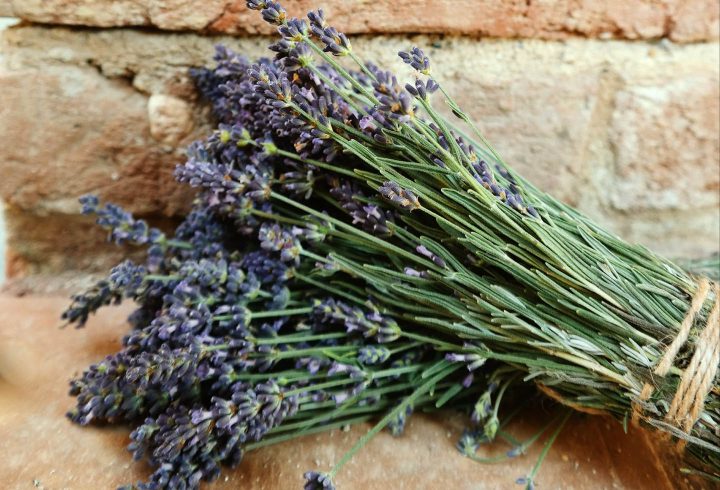
4. Lemon Balm. Lemon balm is an herb that actually comes from the mint family. It is great for reducing stress and improving relaxation. Evidence suggests that lemon balm could be effective at increasing GABA levels, which improve sleepiness.
- Further studies show up to a 42% reduction in symptoms of insomnia after patients took a lemon balm extract for 15 days.8)Cases J, Ibarra A, Feuillère N, Roller M, Sukkar SG. Pilot trial of Melissa officinalis L. leaf extract in the treatment of volunteers suffering from mild-to-moderate anxiety disorders and sleep disturbances. Med J Nutrition Metab. 2011 Dec;4(3):211-218. doi: 10.1007/s12349-010-0045-4.
- The warm and refreshing lemon balm tea could be an incredible benefit to your night-time routine, and the flavor will likely appeal to plenty of people.
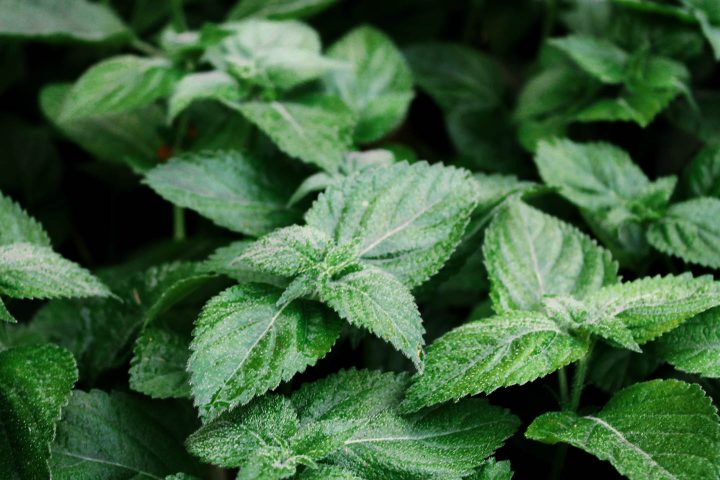
5. Passionflower. Made from the dried stems, flowers, and leaves of the Passiflora plant, passionflower tea is a traditional solution to feelings of anxiety and insomnia. Studies indicate that this substance may be suitable for improving sleep quality and insomnia.9)La Forge T. Drink A Cup of Passionflower Tea Every Night for Better Sleep. Healthline, May 31, 2019
- A study among 40 adults found that those drinking passionflower tea for one week reported a significantly better quality of sleep than their counterparts.10)Ngan A, Conduit R. A double-blind, placebo-controlled investigation of the effects of Passiflora incarnata (passionflower) herbal tea on subjective sleep quality. Phytother Res. 2011 Aug;25(8):1153-9. doi: 10.1002/ptr.3400.
- Further studies have shown that a combination of passionflower and other relaxing substances like valerian root can be excellent for treating insomnia.
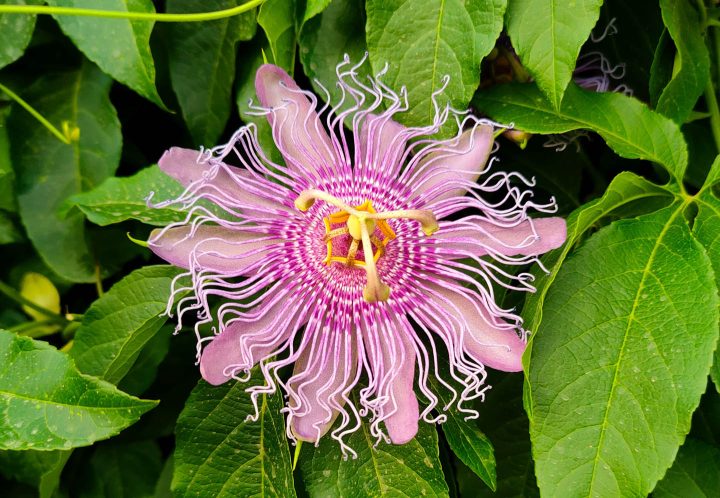
Sip Your Way to Sleep
Many delightful herbal teas are now making their way into the market as powerful sleep aids. Although these teas won’t eliminate the underlying cause of your sleeping or stress issues, they can help you to get the relaxation you need.
For those suffering from high levels of anxiety and stress, the teas above offer a natural solution to common issues like insomnia. However, if you are using these teas for sleep improvement, try to avoid using any sweeteners, as these could increase your blood sugar levels and make you feel more awake.
For a natural and pleasant alternative to pharmaceuticals, consider trying these teas to help relieve stress and support a great night of sleep that refreshes you.
Do you need a guide to help you understand how to cope with Stress in an all inclusive approach? Learn how to combat stress, mentally, physically, emotionally and strategically in your life.

Martin Neumann was trained for Lifestyle Interventions in 1998 at Wildwood Lifestyle Center & Hospital. Since then he has lectured in different parts of the world about a healthy lifestyle and natural remedies. He is the founder of the Abundant Health website.
References
| ↑1 | Roth T. Insomnia: definition, prevalence, etiology, and consequences. J Clin Sleep Med. 2007 Aug 15;3(5 Suppl):S7-10. PMID: 17824495 |
|---|---|
| ↑2 | Adib-Hajbaghery M, Mousavi SN. The effects of chamomile extract on sleep quality among elderly people: A clinical trial. Complement Ther Med. 2017 Dec;35:109-114. doi: 10.1016/j.ctim.2017.09.010. |
| ↑3 | Valerian. Fact Sheet for Health Professionals. National Institutes of Health |
| ↑4 | Dorn M. Wirksamkeit und Verträglichkeit von Baldrian versus Oxazepam bei nichtorganischen und nichtpsychiatrischen Insomnien: Eine randomisierte, doppelblinde, klinische Vergleichsstudie [Efficacy and tolerability of Baldrian versus oxazepam in non-organic and non-psychiatric insomniacs: a randomised, double-blind, clinical, comparative study]. Forsch Komplementarmed Klass Naturheilkd. 2000 Apr;7(2):79-84. German. doi: 10.1159/000021314. |
| ↑5 | Leathwood PD, Chauffard F, Heck E, Munoz-Box R. Aqueous extract of valerian root (Valeriana officinalis L.) improves sleep quality in man. Pharmacol Biochem Behav. 1982 Jul;17(1):65-71. doi: 10.1016/0091-3057(82)90264-7. |
| ↑6 | Chen SL, Chen CH. Effects of Lavender Tea on Fatigue, Depression, and Maternal-Infant Attachment in Sleep-Disturbed Postnatal Women. Worldviews Evid Based Nurs. 2015 Dec;12(6):370-9. doi: 10.1111/wvn.12122. |
| ↑7 | Chien LW, Cheng SL, Liu CF. The effect of lavender aromatherapy on autonomic nervous system in midlife women with insomnia. Evid Based Complement Alternat Med. 2012;2012:740813. doi: 10.1155/2012/740813. |
| ↑8 | Cases J, Ibarra A, Feuillère N, Roller M, Sukkar SG. Pilot trial of Melissa officinalis L. leaf extract in the treatment of volunteers suffering from mild-to-moderate anxiety disorders and sleep disturbances. Med J Nutrition Metab. 2011 Dec;4(3):211-218. doi: 10.1007/s12349-010-0045-4. |
| ↑9 | La Forge T. Drink A Cup of Passionflower Tea Every Night for Better Sleep. Healthline, May 31, 2019 |
| ↑10 | Ngan A, Conduit R. A double-blind, placebo-controlled investigation of the effects of Passiflora incarnata (passionflower) herbal tea on subjective sleep quality. Phytother Res. 2011 Aug;25(8):1153-9. doi: 10.1002/ptr.3400. |
I enjoyed reading this insightful thoroughly research finding!
However, I seem to have a big challenge with those herbs locally here, in Uganda,East Africa – where I live!
Whether in capsules, weeds or even a trace of it!
Thank you, again; for your concern on our/my personal health!
Regards,
Reverend Francis